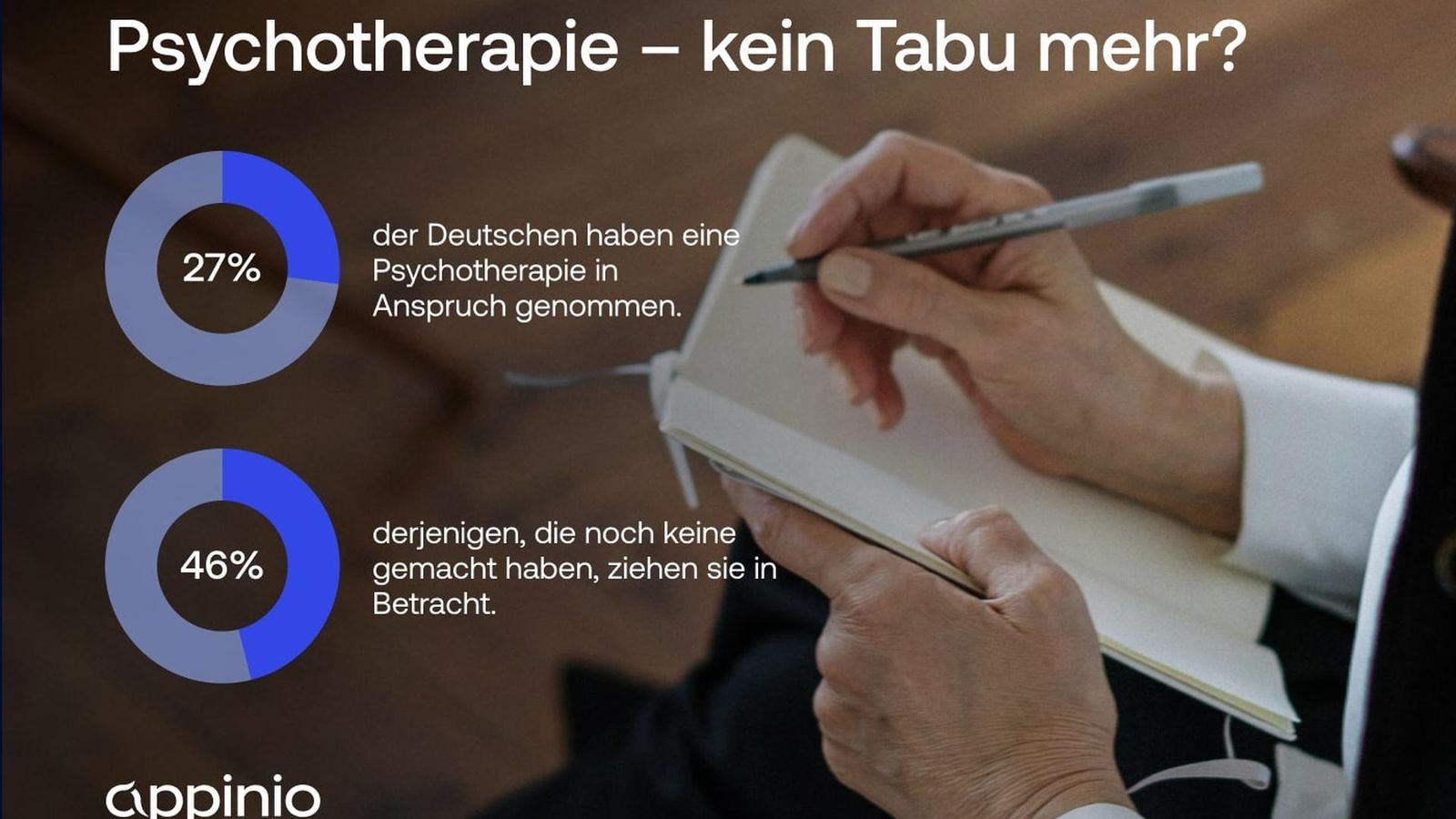
Talking to more happiness / One in four Germans has already used psychotherapy
Hamburg. Are psychotherapy, counseling centers and self-help groups still taboo? May is Mental Health Awareness Month – to mark this, REDEZEIT FÜR DICH and Appinio surveyed 3,000 people from Germany, Spain, France, the USA and Great Britain* about their mental health and use of support services. The study shows a growing acceptance of mental support services in almost all countries, current obstacles and opportunities.
Are psychotherapy, counseling centers and self-help groups still taboo? May is Mental Health Awareness Month – to mark this, REDEZEITFür DICH and Appinio surveyed 3,000 people from Germany, Spain, France, the USA and Great Britain* about their mental health and use of support services. The study shows growing acceptance of mental support services in almost all countries, current barriers and opportunities.
- Germans are happier: 81 percent of Germans say they are currently (rather) happy. Just over one in three Germans (39%) have experienced an improvement in their mental health in the last year, especially young people between the ages of 16 and 24. More than half (56%) of them say that their mental health has (rather) improved in the last year.
- One in four Germans has already undergone psychotherapy (27%). Another 46 percent are considering it.
- Various obstacles to access: Time, money, courage and the belief that the psychological stress is not strong enough.
The difficult trip to the therapist?
“Talking helps to reduce mental stress” – 91 percent of Germans agree with this statement (somewhat to completely). In addition, three in four people say they sometimes or often talk about their mental health with others, such as friends or family (76%). The survey also shows a clear trend towards seeking professional help: one in four Germans has already sought psychotherapy and another large proportion (46%) are considering this. The same applies to the use of medical or psychiatric help for mental health.
Despite these positive trends, a large proportion of respondents say they do not seek help. The main reasons for this are the belief that their psychological stress is not strong enough (41%), a lack of courage to seek help (25%), as well as time (25%) and financial hurdles (18%). Furthermore, many do not know where to find suitable information (16%) or cannot find a place that is covered by the statutory health insurance (14%). An opportunity: Two out of three Germans could imagine using online help services (65%). This shows that digital solutions could play an increasingly important role in mental health care.
“Digitalization has a complex and multifaceted impact on mental health, with both positive and negative aspects. Integrating digital solutions into mental healthcare can help improve access to help. At the same time, policy measures should be taken to create a healthy digital infrastructure that ensures privacy protection and responsible use of information,” says Karen Tippkötter, communications from REDEZEIT FOR DICH.
Neighbouring country France: Therapy-shy?
Offers of mental help are also gaining more and more attention internationally. In the USA, one in three people has already used psychotherapy (33%) – a further 40 percent can imagine psychotherapy in the future. In France, participation in mental health services is comparatively low. Only 13 percent of respondents said they had used psychotherapy. Overall, French people are also much less likely to talk about their mental health with others: almost half of French people said they never or rarely talk about it (46%), and significantly fewer French people agreed with the statement that talking helps reduce mental stress. The hurdles to using mental health services vary depending on the country. While Germans and French people often lack courage, respondents from the USA more often say they cannot afford private help. In Spain, there is often a lack of places in statutory health insurance.
The survey also revealed interesting international comparisons on the topic of digitalization. In France, 42 percent of respondents see online services as an option, while 58 percent remain skeptical. In Spain, 50 percent of the population is open to online help services, although many prefer face-to-face interaction. In the UK, online support services are popular with 71 percent of respondents, indicating a high level of openness to digital health services. In the USA, the acceptance of discussions about mental health and online offers is particularly high compared to other countries (74%).
* Citation: The surveys were conducted by Appinio from May 2 to 14, 2024. 1,000 people in Germany and 500 people each in France, Spain, the USA and Great Britain were surveyed, aged 16 to 65, nationally representative of the age and gender of the national population.
–
The German study results in the Appinio dashboard can be found here.
You can find the international study results in the Appinio dashboard here.
–
About Appinio
Appinio is a global market research platform that stands for innovative and uncomplicated market research. The platform enables companies to quickly and efficiently survey specific target groups and receive representative results in real time. Appinio delivers millions of opinions from 90+ markets every day for over 2,000 clients, including companies in the consumer goods, mobility, technology and all leading agencies and management consultancies. The company was founded in 2014 by Jonathan Kurfess (Chairman), Max Honig (CEO) and Kai Granaß (CTO) and is headquartered in Hamburg. For more information, visit https://www.appinio.com/de/
About SPEAKING TIME FOR YOU #virtualsupporttalks
TALKING TIME FOR YOU #virtualsupporttalks is a platform of over 400 coaches, therapists and psychologists trained in listening who volunteer to lend their ear and listen to other people – free of charge and without obligation. They want to send a signal of hope and support in difficult times. Since it was founded in March 2020, our “silent heroes” have already helped over 8,500 people.
The organization is non-profit, socially oriented and does not pursue economic, political or religious goals. It was founded in March 2020 by four practicing coaches from Hamburg and is free for everyone. All listeners at REDEZEIT listen regardless of the topic, origin, background, identity, sexuality, religion or political views.
Press contact: Appinio GmbH Anja Nitschke PR & Communications Manager [email protected] 040 80811681
Further material: www.presseportal.de Source: appinio GmbH

Ethel Purdy – Medical Blogger & Pharmacist
Bridging the world of wellness and science, Ethel Purdy is a professional voice in healthcare with a passion for sharing knowledge. At 36, she stands at the confluence of medical expertise and the written word, holding a pharmacy degree acquired under the rigorous education systems of Germany and Estonia.
Her pursuit of medicine was fueled by a desire to understand the intricacies of human health and to contribute to the community’s understanding of it. Transitioning seamlessly into the realm of blogging, Ethel has found a platform to demystify complex medical concepts for the everyday reader.
Ethel’s commitment to the world of medicine extends beyond her professional life into a personal commitment to health and wellness. Her hobbies reflect this dedication, often involving research on the latest medical advances, participating in wellness communities, and exploring the vast and varied dimensions of health.
Join Ethel as she distills her pharmaceutical knowledge into accessible wisdom, fostering an environment where science meets lifestyle and everyone is invited to learn. Whether you’re looking for insights into the latest health trends or trustworthy medical advice, Ethel’s blog is your gateway to the nexus of healthcare and daily living.



